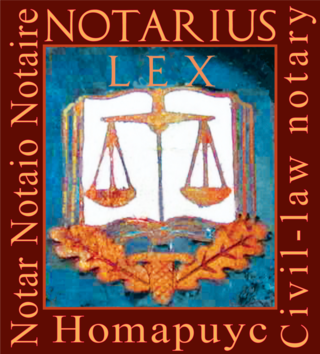
An affidavit is a written statement voluntarily made by an affiant or deponent under an oath or affirmation which is administered by a person who is authorized to do so by law. Such a statement is witnessed as to the authenticity of the affiant's signature by a taker of oaths, such as a notary public or commissioner of oaths. An affidavit is a type of verified statement or showing, or in other words, it contains a verification, which means that it is made under oath on penalty of perjury, and this serves as evidence for its veracity and is required in court proceedings.

A notary public of the common law is a public officer constituted by law to serve the public in non-contentious matters usually concerned with general financial transactions, estates, deeds, powers-of-attorney, and foreign and international business. A notary's main functions are to validate the signature of a person ; administer oaths and affirmations; take affidavits and statutory declarations, including from witnesses; authenticate the execution of certain classes of documents; take acknowledgments ; provide notice of foreign drafts; provide exemplifications and notarial copies; and, to perform certain other official acts depending on the jurisdiction. Such transactions are known as notarial acts, or more commonly, notarizations. The term notary public only refers to common-law notaries and should not be confused with civil-law notaries.

Authentication is the act of proving an assertion, such as the identity of a computer system user. In contrast with identification, the act of indicating a person or thing's identity, authentication is the process of verifying that identity. It might involve validating personal identity documents, verifying the authenticity of a website with a digital certificate, determining the age of an artifact by carbon dating, or ensuring that a product or document is not counterfeit.

Civil-law notaries, or Latin notaries, are lawyers of noncontentious private civil law who draft, take, and record legal instruments for private parties, provide legal advice and give attendance in person, and are vested as public officers with the authentication power of the State. As opposed to most notaries public, their common-law counterparts, civil-law notaries are highly trained, licensed practitioners providing a full range of regulated legal services, and whereas they hold a public office, they nonetheless operate usually—but not always—in private practice and are paid on a fee-for-service basis. They often receive generally the same education as attorneys at civil law with further specialized education but without qualifications in advocacy, procedural law, or the law of evidence, somewhat comparable to solicitor training in certain common-law countries.
Legal instrument is a legal term of art that is used for any formally executed written document that can be formally attributed to its author, records and formally expresses a legally enforceable act, process, or contractual duty, obligation, or right, and therefore evidences that act, process, or agreement. Examples include a certificate, deed, bond, contract, will, legislative act, notarial act, court writ or process, or any law passed by a competent legislative body in domestic or international law. Many legal instruments were written under seal by affixing a wax or paper seal to the document in evidence of its legal execution and authenticity. However, today many jurisdictions have done away with the requirement of documents being under seal in order to give them legal effect.

The Convention of 5 October 1961 Abolishing the Requirement of Legalisation for Foreign Public Documents, also known as the Apostille Convention, is an international treaty drafted by the Hague Conference on Private International Law (HCCH). The Apostille Convention is intended to simplify the procedure through which a document, issued in one of the contracting states, can be certified for legal purposes in the other contracting states of the Convention. A certification under the Convention is called an apostille or Hague apostille. An apostille is an international certification comparable to a notarisation, and may supplement a local notarisation of the document. If the Convention applies between two states, an apostille issued by the state of origin is sufficient to certify the document, and removes the need for further certification by the destination state.

A certified copy is a copy of a primary document that has on it an endorsement or certificate that it is a true copy of the primary document. It does not certify that the primary document is genuine, only that it is a true copy of the primary document.

In international law, documentlegalization is the process of authenticating or certifying a document so it can be accepted in another country.
An eschatocol, or closing protocol, is the final section of a legal or public document, which may include a formulaic sentence of appreciation; the attestation of those responsible for the document, which may be the author, writer, countersigner, principal parties involved, and witnesses to the enactment or the subscription; or both. It also expresses the context of the documentation of the action described therein, i. e., enunciation of the means of validation and indication of who is responsible to document the act; and the final formulae.
A Commissioner of Deeds is an officer having authority to take affidavits, depositions, acknowledgments of deeds, etc., for use in the state by which the person is appointed. The office is similar to that of Notaries Public; thus, commissioners of deeds generally authenticate their acts with some type of official seal.

Notaries public in New York are commissioned by the Secretary of State of New York after passing a short examination in law and procedure and submitting an application for appointment accompanied by the proper fees. A notary's commission is received from and kept on file with the county clerk of the county in which they reside or do business, but notaries are empowered to actually perform their duties anywhere in the state.
In the law of the United States of America, an objection is a formal protest to evidence, argument, or questions that are in violation of the rules of evidence or other procedural law. Objections are often raised in court during a trial to disallow a witness's testimony, and may also be raised during depositions and in response to written discovery.
In canon law, a canonical act is an official register of documents used in ecclesiastical procedures.
A certified translation is one which fulfills the requirements in the country in question, enabling it to be used in formal procedures, with the translator accepting responsibility for its accuracy. These requirements vary widely from country to country. While some countries allow only state-appointed translators to produce such translations, others will accept those carried out by any competent bilingual individual. Between these two extremes are countries where a certified translation can be carried out by any professional translator with the correct credentials.
In the U.S. state of Florida, a notary public is a public officer appointed by the governor of the state to take acknowledgments, administer oaths, attest to photocopies of certain documents, solemnize marriage, protest the non-acceptance or non-payment of negotiable instruments, and perform other duties specified by law.
A public instrument is any legal instrument recorded with and authenticated by a public office or employee. To carry weight, any such instrument, must be genuine and authentic. Public instruments consequently must bear the name, title, and seal of the official that issued them, and should be written in the presence of witnesses who attested to them.
An act is an instrument that records a fact or something that has been said, done, or agreed. Acts generally take the form of legal instruments of writing that have probative value and executory force. They are usually accepted as self-authenticating demonstrative evidence in court proceedings, though with the precarious status of notaries public and their acts under common law, this is not always so.
In the United States, a notary public is a person appointed by a state government, e.g., the governor, lieutenant governor, secretary of state, or in some cases the state legislature, and whose primary role is to serve the public as an impartial witness when important documents are signed. Since the notary is a state officer, a notary's duties may vary widely from state to state and in most cases, a notary is barred from acting outside his or her home state unless they have a commission there as well.
A notarial act is any written narration of facts (recitals) drawn up by a notary, notary public or civil-law notary authenticated by the notary's signature and official seal and detailing a procedure which has been transacted by or before the notary in their official capacity. A notarial act is the only lawful means of proving those facts of which it is the recognized record, whereas on other matters it is usually inadmissible, because, being beyond the powers entrusted to the notary by law, it is non-official. In most common-law countries, multiple-page acts are bound together using a sewn or knotted ribbon, the ends of which are secured by a wafer impressed with the notary's seal. This is called annexing or annexure.
Citizens' Service Centres, also known as Citizens Service Centers (KEPs), or Citizens' Service Centers (KEPs) or (CSCs) or Citizens' Services Centre (KEP) or Citizens' Services Center (KEP) or (CSC) in singular, are state offices established by article 31 of law 3013/2002, initially in the Prefectures' capitals (Headquarters), in order to reduce bureaucracy and faster service to citizens in terms of their transactions with the state. The role of Citizens' Service Centres is to be the contact points of the Public Services with the citizens and to provide one-stop services.








